'Chameleon' truckers creating dangerous driving conditions
Dangerous drivers who get their licenses revoked can't go and get another one, but that's not the case with some of the biggest and most dangerous vehicles on the road. The WRAL Investigates team found that troubled trucking companies can shut down, change their name and get back on the road, sometimes within days.
Posted — UpdatedThe WRAL Investigates team found that troubled trucking companies can shut down, change their name, apply for a new U.S. Department of Transportation number and get back on the road, sometimes within days.
While the government is increasingly cracking down on unsafe busing companies, it routinely fails to do background checks on trucking companies’ applications.
On May 11, 2011, four people died and dozens were injured when a Charlotte-based tour bus ran off Interstate 95 in Carolina County, Va. The Federal Motor Carrier Safety Administration immediately shut down the company, Sky Express. Within days, the company came back to life under new names – 108 Tours and 108 Bus. Federal officials immediately closed those companies as well.
The federal government receives about 66,000 applications for U.S. DOT numbers each year from passenger carriers, moving companies and freight carriers. However, 98 percent of those applications – for freight carriers alone – are not cross-checked, which can allow troubled trucking companies to shut down and start back up almost immediately.
During a five-year period, chameleon big rigs were involved in crashes that killed 217 people in the U.S. and injured more than 3,500 others, according to the audit.
“By ignoring safety rules, these operators put both passengers and other motorists’ lives at serious risk, and shutting them down will save lives,” U.S. Transportation Secretary Ray LaHood said in 2011.
Auditors identified potential chameleon carriers by matching application information, such as company name, registered agent, phone number and address. Then, they looked at motive, such as whether the older carrier had safety or money issues.
Auditors said very little is being done to catch them.
Federal Motor Carrier Safety Administration officials say they don’t have the resources to catch chameleon companies. However, auditors were able to create a cross-checking program for their study. The WRAL Investigates team decided to do the same and analyzed hundreds of trucking company records.
U.S. DOT officials say Elite's original company was never reinstated. However, Elite Inc.'s recent record shows two crashes this year, including a fatal crash that killed an Elite driver and his passenger in Cadiz, Ky., on Sept. 23.
Tire failure reportedly caused the crash that killed Joseph A. Robinson, 34, of Wendell, and Larry D. Artis, 55, of Wilson, according to a preliminary investigation by Kentucky State Police.
The federal records regarding what happened in Elite's other crash this year have not been released.
“We probably want to look at this,” said Captain Doug Shackelford, who leads the state Highway Patrol's motor carrier enforcement. “It is a safety concern. Once you place a vehicle out of service for an imminent hazard, that vehicle should not operate.”
The WRAL Investigates team went to Elite Freight System Inc.’s address and talked to property owner Jefferson Salmon. He said he canceled his authority in Elite so he could turn over the company to his children.
“We didn't do anything to try and dodge the (U.S.) DOT. I told them what we wanted to do, and they agreed,” he said.
Salmon still works in the same office at the same address. After a history of safety violations, the family wanted a fresh start, according to his son, Jeffrey Salmon. They parked the older trucks and replaced them on the road with leased trucks while still using the same trailers.
"We were trying to solve a problem, not getting around something," Jeffrey Salmon said.
The problem is the newly named company has been hit with some of the same old violations. During roadside inspections, its trucks were pulled out of service nearly 32 percent of the time, and inspectors put the brakes on Elite drivers almost 10 percent of the time. Both numbers are well above the national average of 20.7 percent for vehicles and 5.5 percent for drivers.
Elite Freight Systems Inc. has had its operating authority revoked three times, but has gotten it reinstated each time. The WRAL Investigates team found other potential red flags – multiple trucking companies tied to that same Ponderosa Service Road address or other members of the Salmon family, all of whom received out-of-service orders.
“Identifying a chameleon carrier can be somewhat difficult,” Shackelford said.
The state Highway Patrol uses the Federal Motor Carrier Safety Administration database, but so far, cases aren't routinely flagged at the federal level. That leaves potholes in a system that's supposed to protect those who share the road with 18-wheelers.
“It’s the ones that cut corners. Safety should always be first,” Shackelford said.
The Federal Motor Carrier Safety Administration declined to answer specific questions for WRAL Investigates' story. Instead, the agency released a statement, saying it "has taken aggressive efforts to strengthen motor carrier safety and enforcement."
"The Agency asked for and was granted greater authority under the recent transportation bill that strengthens its ability to crack down on chameleon characters by establishing a single national standard that eliminates the loophole allowing bus and truck companies that have been shut down for unsafe operations to reincarnate themselves," the agency said in a statement.
That system is not yet operational.
• Credits
Copyright 2024 by Capitol Broadcasting Company. All rights reserved. This material may not be published, broadcast, rewritten or redistributed.





